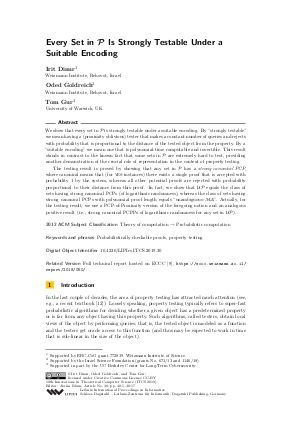Every Set in P Is Strongly Testable Under a Suitable Encoding
Authors Irit Dinur, Oded Goldreich, Tom Gur
-
Part of:
Volume:
10th Innovations in Theoretical Computer Science Conference (ITCS 2019)
Part of: Series: Leibniz International Proceedings in Informatics (LIPIcs)
Part of: Conference: Innovations in Theoretical Computer Science Conference (ITCS) - License:
 Creative Commons Attribution 3.0 Unported license
Creative Commons Attribution 3.0 Unported license
- Publication Date: 2019-01-08
File

PDF
LIPIcs.ITCS.2019.30.pdf
- Filesize: 0.55 MB
- 17 pages
Document Identifiers
Related Versions
-
Full technical report hosted on ECCC [I. Dinur et al., 2018], https://eccc.weizmann.ac.il/report/2018/050/.
Subject Classification
ACM Subject Classification
- Theory of computation → Probabilistic computation
Keywords
- Probabilistically checkable proofs
- property testing
Metrics
- Access Statistics
-
Total Accesses (updated on a weekly basis)
0Document
0Metadata
Abstract
We show that every set in P is strongly testable under a suitable encoding. By "strongly testable" we mean having a (proximity oblivious) tester that makes a constant number of queries and rejects with probability that is proportional to the distance of the tested object from the property. By a "suitable encoding" we mean one that is polynomial-time computable and invertible. This result stands in contrast to the known fact that some sets in P are extremely hard to test, providing another demonstration of the crucial role of representation in the context of property testing. The testing result is proved by showing that any set in P has a strong canonical PCP, where canonical means that (for yes-instances) there exists a single proof that is accepted with probability 1 by the system, whereas all other potential proofs are rejected with probability proportional to their distance from this proof. In fact, we show that UP equals the class of sets having strong canonical PCPs (of logarithmic randomness), whereas the class of sets having strong canonical PCPs with polynomial proof length equals "unambiguous- MA". Actually, for the testing result, we use a PCP-of-Proximity version of the foregoing notion and an analogous positive result (i.e., strong canonical PCPPs of logarithmic randomness for any set in UP).
Cite As Get BibTex
Irit Dinur, Oded Goldreich, and Tom Gur. Every Set in P Is Strongly Testable Under a Suitable Encoding. In 10th Innovations in Theoretical Computer Science Conference (ITCS 2019). Leibniz International Proceedings in Informatics (LIPIcs), Volume 124, pp. 30:1-30:17, Schloss Dagstuhl – Leibniz-Zentrum für Informatik (2019)
https://doi.org/10.4230/LIPIcs.ITCS.2019.30
BibTex
@InProceedings{dinur_et_al:LIPIcs.ITCS.2019.30,
author = {Dinur, Irit and Goldreich, Oded and Gur, Tom},
title = {{Every Set in P Is Strongly Testable Under a Suitable Encoding}},
booktitle = {10th Innovations in Theoretical Computer Science Conference (ITCS 2019)},
pages = {30:1--30:17},
series = {Leibniz International Proceedings in Informatics (LIPIcs)},
ISBN = {978-3-95977-095-8},
ISSN = {1868-8969},
year = {2019},
volume = {124},
editor = {Blum, Avrim},
publisher = {Schloss Dagstuhl -- Leibniz-Zentrum f{\"u}r Informatik},
address = {Dagstuhl, Germany},
URL = {https://drops.dagstuhl.de/entities/document/10.4230/LIPIcs.ITCS.2019.30},
URN = {urn:nbn:de:0030-drops-101234},
doi = {10.4230/LIPIcs.ITCS.2019.30},
annote = {Keywords: Probabilistically checkable proofs, property testing}
}
Author Details
Funding
- Dinur, Irit: Supported by ERC-CoG grant 772839. Weizmann Institute of Science.
- Goldreich, Oded: Supported by the Israel Science Foundation (grants No. 671/13 and 1146/18).
- Gur, Tom: Supported in part by the UC Berkeley Center for Long-Term Cybersecurity.
References
-
N. Alon, E. Fischer, M. Krivelevich, and M. Szegedy. Efficient testing of large graphs. Combinatorica, 20:451-476, 2000.

-
N. Alon, E. Fischer, I. Newman, and A. Shapira. A combinatorial characterization of the testable graph properties: It’s all about regularity. STOC, pages 251-260, 2006.

-
S. Arora, C. Lund, R. Motwani, M. Sudan, and M. Szegedy. Proof verification and intractability of approximation problems. JACM, 45:501-555, 1998.

-
S. Arora and S. Safra. Probabilistic checkable proofs: A new characterization of NP. JACM, 45:70-122, 1998.

-
E. Ben-Sasson, O. Goldreich, P. Harsha, M. Sudan, and S. Vadhan. Robust pcps of proximity, shorter pcps, and applications to coding. SICOMP, 36(4):889-974, 2006.

-
E. Ben-Sasson and M. Sudan. Short pcps with polylog query complexity. SICOMP, 38(2):551-607, 2008.

-
M. Blum, M. Luby, and R. Rubinfeld. Self-testing/correcting with applications to numerical problems. JCSS, 47(3):549-595, 1993.

-
I. Dinur. The pcp theorem by gap amplification. JACM, 54:3, 2007.

-
I. Dinur, O. Goldreich, and T. Gur. Every set in p is strongly testable under a suitable encoding. Technical report, in ECCC TR18-050, 2018.

-
I. Dinur and O. Reingold. Assignment-testers: Towards a combinatorial proof of the pcp-theorem. FOCS, 45, 2004.

-
O. Goldreich. Computational Complexity: A Conceptual Perspective. Cambridge University Press, 2008.

-
O. Goldreich. Introduction to Property Testing. Cambridge University Press, 2017.

-
O. Goldreich, S. Goldwasser, and D. Ron. Property testing and its connection to learning and approximation. JACM, pages 653-750, 1998.

-
O. Goldreich, T. Gur, and I. Komargodski. Strong locally testable codes with relaxed local decoders. CCC, 30:1-41, 2015.

-
O. Goldreich, M. Krivelevich, I. Newman, and E. Rozenberg. Hierarchy theorems for property testing. Computational Complexity, 21(1):129-192, 2012.

-
O. Goldreich and D. Ron. Property testing in bounded degree graphs. Algorithmica, pages 302-343, 2002.

-
O. Goldreich and D. Ron. On proximity oblivious testing. SICOMP, 40(2):534-566, 2011.

-
O. Goldreich and I. Shinkar. Two-sided error proximity oblivious testing. RSA, 48(2):341-383, 2016.

-
O. Goldreich and M. Sudan. Locally testable codes and pcps of almost-linear length. JACM, 53(4):558-655, 2006.

-
T. Gur, G. Ramnarayan, and R. Rothblum. Relaxed Locally Correctable Codes. ITCS. ECCC, 2018.

-
T. Gur and R. Rothblum. Non-interactive proofs of proximity. Computational Complexity, 2018.

